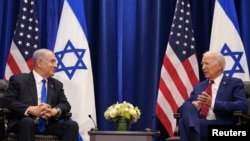U.S. President Joe Biden met Wednesday with Israeli Prime Minister Benjamin Netanyahu in New York to discuss Israel’s expansion of settlements in the occupied West Bank and attempts to overhaul Israel’s judicial system, which critics said threatens that country’s democracy.
“We're going to discuss some of the hard issues,” Biden warned Netanyahu, even as he reaffirmed U.S. commitment to Israel as “ironclad.”
“And that is upholding democratic values that lie at the heart of our partnership, including the checks and balances in our systems, and preserving the path to a negotiated two-state solution and ensuring that Iran never, never acquires a nuclear weapon,” Biden said.
Leaders of Israel are typically invited to the White House within weeks of taking office, but Biden is only now holding his first bilateral meeting with Netanyahu, nine months after the prime minister formed his far-right government. Netanyahu’s hard-line government’s treatment of Palestinians and effort to curb the powers of the judiciary are widely seen as the reasons that Biden delayed the meeting.
“Our friendship goes a long way and can take us a long way,” Netanyahu said, referring to his four-decade relationship with Biden.
The pair discussed a potential Israel-Saudi normalization deal and an expansion of the Trump administration’s 2020 Abraham Accords that facilitated diplomatic ties between Israel and its Arab neighbors Bahrain and the United Arab Emirates, followed by Morocco and Sudan.
“Such a peace would go a long way for us to advance the end of the Arab-Israeli conflict, achieve reconciliation between the Islamic world and the Jewish state, and advance a genuine peace between Israel and the Palestinians,” Netanyahu said.
Both praised the recent India-Middle East-Europe Economic Corridor initiative announced by Biden, Indian Prime Minister Narendra Modi and Saudi Crown Prince Mohammed bin Salman in New Delhi during a summit of the 20 biggest economies, the G20. The transnational rail and shipping project spanning two continents is designed to bolster economic integration among Asia, the Persian Gulf countries, Israel and Europe.
Israel-Saudi normalization
“If you and I, 10 years ago, were talking about normalization with Saudi Arabia, I think we’d look at each other like, 'Who's been drinking what?'” Biden joked to Netanyahu.
The Biden administration has for months held separate negotiations with the Saudis and Israelis to lay the groundwork for normalization. Washington hopes such a deal will lead to a more stable Middle East and potentially a Saudi kingdom that aligns more closely with the United States in its rivalry with China.
Israel stands to benefit from the wider political and economic impact of normalizing relations with the Saudis, a key Arab country and opinion-maker in the Muslim world. A deal could lead to recognition from other Muslim-majority countries, including Indonesia and Malaysia – a huge win for Netanyahu.
However, a deal also carries significant political risk.
It’s not clear what the Saudis want from Israel, said Dan Ardell, an Israeli Foreign Service veteran and scholar in residence at the Center for Israel Studies at American University. It’s also not clear what Netanyahu’s coalition partners will be willing to support, Ardell told VOA.
Publicly, the Saudis say normalization can come only after a two-state solution and better treatment of Palestinians in the territories that Israel occupies. Many members of Netanyahu’s coalition are against Palestinian statehood and support settlement expansion.
Riyadh is also reportedly seeking a pact that includes protection from Iran, in the form of some kind of mutual defense pact with Washington, and U.S. support for its own civilian nuclear program, including in-country enrichment, as it anticipates its oil running out.
Netanyahu “wants the U.S. to pay the Saudis for the deal, so he does not have to pay in ‘Palestinian currency,’ which would bring down the [Israeli] government,” said Jonathan Rynhold, head of the Department of Political Studies at Bar Ilan University. “I think this is unrealistic on Bibi's part,” he told VOA, using a nickname for the prime minister.
In part to secure support from his Democratic Party lawmakers in Congress, Biden may push Netanyahu for a pledge to never annex the occupied West Bank or expand Israeli settlements – a cost that may be too high for a prime minister who came to power with the support of a coalition seen as the most right-wing in Israel’s history.
Iran nuclear threat
During the meeting, the two leaders reiterated their commitment to ensuring Iran never acquires a nuclear weapon and countering “all threats posed by Iran and its proxies,” according to the White House.
Iran maintains its nuclear program is for peaceful purposes.
Netanyahu suggested to Biden that preventing Iran from achieving nuclear weapons capability can “be best achieved by a credible military threat, crippling sanctions and supporting the brave men and women of Iran who despise that regime and who are real partners for a better future.”
White House officials have said it is not interested in imposing regime change on other countries and have rejected that as the goal of U.S. policy toward Iran.
"They still have opportunities before them to act like a responsible nation state, in the region and beyond," John Kirby, spokesman for the National Security Council, told VOA during a briefing Wednesday. "And yet they continue to take action after action in refute of that, but I don't have any changes with respect to our policy."
Sign of US displeasure
The bilateral meeting, scheduled for 10.15 a.m. Wednesday, was delayed by more than 30 minutes, although Netanyahu was seen entering the venue on time. The White House did not provide an explanation for the delay. It announced after the meeting, however, that Biden had invited Netanyahu to Washington before the end of the year.
By delaying the meeting until now and holding it in the New York hotel where Biden is staying as he attended the U.N. General Assembly, the administration is signaling displeasure over Israeli government policy, American University’s Ardell said.
The message was, “We can do things together but we have serious concerns and also equally real expectations that you move forward on several of the issues that are of concern to us,” he said.
Biden’s cool treatment of Netanyahu may not directly influence Israeli politics or its treatment of Palestinians, Rynhold said. “However, it would clarify to the Israeli public that they are paying a major economic, diplomatic and strategic price because of the far-right ideological character of the government.”
A human rights organization representing more than 2,300 rabbis and cantors in North America is planning a Friday protest in New York over Netanyahu’s “continued plans to gut Israel’s judicial system and his willingness to destroy democratic norms and ally with extremists.”





